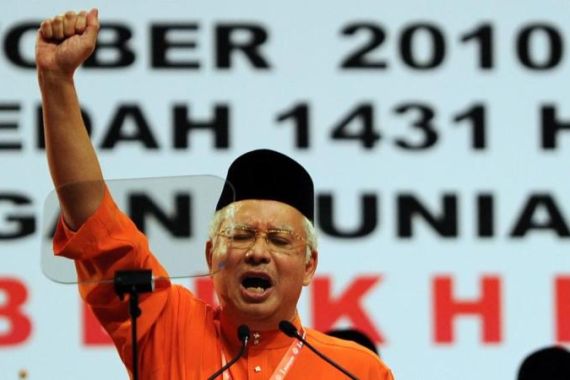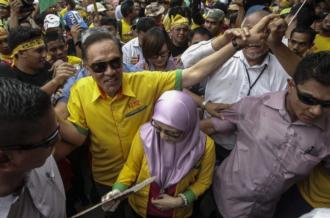Bruising battle awaits Malaysian politicians
Upcoming parliamentary elections could unseat long-ruling coalition and take the Southeast Asian state in new direction.

Kuala Lumpur, Malaysia – Prime Minister Najib Tun Razak dissolved Malaysia’s parliament on Wednesday to prepare for a long-awaited general election that could, for the first time, unseat the coalition that has ruled the country almost without interruption for more than two generations.
The Elections Commission will set the date for the poll, which is likely to take place in late April after a short campaigning period.
Najib dissolved parliament just weeks before its five-year term would have lapsed automatically under the constitution. He’s the only Malaysian prime minister to wait so long to seek a fresh mandate for his government, and some pundits have questioned the decision.
“He should have held the elections two years ago when the momentum was swinging in his favour,” said Subramaniam Pillay, an academic and a member of the organising committee for Bersih, which campaigns for free-and-fair elections. Now, “the outcome will be really close. It’s going to be a very tough fight”.
|
“We are seeing a breakdown of the old order, but no one’s quite sure what will take its place.” – Keith Leong, political analyst |
Malaysians are facing a real political choice for the first time in their post-colonial history, and the election is in some ways a referendum on their country’s future direction.
On the one hand, the Barisan Nasional, the dominant political force of the past 50 years, is portraying itself as the only group that can deliver the economic growth and stability that will ensure Malaysia joins the ranks of the world’s developed nations.
On the other, the opposition Pakatan Rakyat – invigorated by its success in the last polls – is promising a vibrant Malaysia underpinned by principles of justice and equality.
“There are now several competing visions of what Malaysia should be like,” said KRA Associates political analyst Keith Leong. “Thus far the Barisan Nasional has been the custodian of that vision, which has been seen as supporting economic growth and racial harmony sometimes at the expense of political freedoms.
“We are seeing a breakdown of the old order, but no one’s quite sure what will take its place. You can be quite sure though that anyone who votes against Barisan is voting against the status quo.”
Political polling is in its infancy in Malaysia, but the most recent Merdeka Center survey of people in Peninsular Malaysia – home to about 80 percent of the country’s population – shows voters’ biggest concerns are corruption, the cost of living and crime. The election will also include some 3.1 million people, mainly professionals under the age of 40, who will be voting for the first time.
Pakatan’s vision
Campaigning has been going on for months already. Leaders of the opposition Pakatan Rakyat have been travelling across the country, even into the remotest parts of Malaysian Borneo, to get their message to voters.
Led by Anwar Ibrahim, the three-party coalition launched its manifesto in March. The document set out Pakatan’s vision for Malaysia: championing honest and transparent government, an efficient bureaucracy, institutional reform, and free education and health care.
Barisan Nasional, made up of a number of race-based parties but dominated by the United Malays National Organisation (UMNO), has yet to release its manifesto, but Najib has been travelling the country, too.
He’s keen to stress the successes of his economic and government “transformation” plans, designed to make Malaysia into a developed nation by the year 2020. In a speech in late March broadcast live on television, Najib told the nation his reforms were doing better than expected and that many projects were ahead of target. The central bank has predicted the economy will expand by as much as 6 percent this year.
 |
| Malaysia’s opposition leader Anwar Ibrahim in January [EPA] |
Dubbed a “State of the Nation” address, the speech underlined the way in which Najib has sought to capitalise on his personal popularity by putting himself at the centre of the coalition’s campaign for re-election. The Merdeka Center survey showed while 61 percent of Malaysians say they’re satisfied with Najib, only 45 percent express the same feeling towards his coalition.
Still, some commentators say the prolonged wait, as well as the presidential-style campaign, suggest Najib doubts his coalition’s ability to win.
Zaid Ibrahim, who set up one of Malaysia’s biggest law firms, was once an UMNO member and the de facto law minister in the cabinet of Najib’s predecessor, Abdullah Ahmad Badawi. After resigning his position, he later joined the opposition and then set up his own party. Now retired, he spends his time blogging and playing golf near his home in the suburbs of Kuala Lumpur.
“The fact that he hasn’t called the election shows he isn’t strong,” Zaid told Al Jazeera. “I think they could lose. Never before has BN pitched its re-election based [entirely] on a personality. It was always about the track record, the policies and the projects.”
A resource-rich country of nearly 29 million people, Malaysia has three major ethnic groups – Malay, Chinese and Indian – as well as many indigenous people. Since Malaya secured its independence in 1957 and then became Malaysia six years later when Sabah and Sarawak joined the federation, the country has changed enormously. What was once a largely agrarian nation has transformed into a centre for electronics manufacturing and the world’s 25th-biggest exporter.
Malaysians have changed, too. The younger generation has grown up in relative prosperity, avoiding many of the hardships their parents and grandparents endured during the Japanese occupation and communist insurgency. For them, warnings of political violence and racial tension have little impact, analysts say. Nor do calls for gratitude from politicians.
Twitter, Youtube, Facebook, web-based media and blogs have become vibrant arenas of political debate, with decisions and remarks from both sides dissected, debated and, sometimes, ridiculed.
High stakes
In 2008, Barisan Nasional won 140 seats in Malaysia’s parliament and Pakatan took 82, leaving Barisan without a two-thirds majority for the first time. In addition, the opposition took control of an unprecedented five states under Malaysia’s federal system. The result was an internal party coup that made Najib UMNO leader – and prime minister – at the expense of Abdullah, even though his popularity with Malaysians was high. Najib will be trying to avoid the same fate.
|
“What worries me is the uncertainty surrounding the electoral process. It’s not one man, one vote.” – Azmi Sharom, political analyst |
The stakes are high not only for Najib, but also for Anwar and the opposition. Anwar was once UMNO’s heir apparent, but in the midst of the Asian financial crisis in the late 1990s, former prime minister Mahathir Mohamad sacked Anwar, triggering mass demonstrations.
Mahathir accused his former deputy of sodomy and corruption. After a lurid trial, in which Anwar argued the charges were politically motivated, he was convicted and jailed. Freed on appeal after six years in prison, Anwar has now become the key figure for the opposition and, at the age of 65, faces what could be his last chance to become prime minister.
Still, despite the successes of 2008, the opposition faces considerable challenges. Critics say Malaysia’s electoral system is neither free nor fair. The Bersih rallies that have drawn tens of thousands of people to the streets of Kuala Lumpur in recent years have highlighted the anomalies, but only a handful of their suggested reforms – including the use of indelible ink and the deployment of domestic election monitors – have been adopted.
Gerrymandering
“The fact that the election will be really close almost goes without saying,” said political analyst and law lecturer Azmi Sharom. “But what worries me is the uncertainty surrounding the electoral process. It’s not one man, one vote.”
Gerrymandering – moving constituency boundaries to benefit certain parties – is common and seats are often poorly distributed, amplifying the distortions of the first-past-the-post system and requiring the opposition to win many more votes than Barisan in order to win a single seat.
In 2008, Barisan’s share of the popular vote was just 51 percent, yet it won 63 percent of the seats. The country’s biggest constituency in terms of number of voters is Kapar, with an electorate of 142,419, while the smallest is the administrative capital of Putrajaya, with just 15,308 voters.
“Phantom voters” – people who don’t even exist – have also been uncovered, while a public enquiry in the Borneo state of Sabah is investigating allegations that the ruling coalition gave citizenship to foreigners in exchange for their votes.
Moreover, the regulations surrounding the election do little to even out the playing field. There are no laws ensuring state funding for parties and no limits on spending, except for individuals. Nor are opposition parties assured access to the media, which is controlled either by the state, or companies linked to the ruling coalition.
In response, Pakatan has developed a highly visible online media presence. Its leaders are active tweeters and videos and statements are quickly posted. Barisan, too, has tried to exploit the opportunities offered by social media.
Despite the obstacles, the opposition is optimistic that 2013 will be its year. “We are at the doorstep of power,” Anwar said in March.
But after more than five decades on top, Barisan is not going to give up without a fight. It is likely to be a bruising battle.